Oyster mushroom tea has been gaining popularity as a nutritious and delicious beverage. This tea harnesses the potential health benefits of oyster mushrooms, known scientifically as Pleurotus ostreatus.
From aiding the immune system to reducing oxidative stress, oyster mushroom tea is a refreshing way to enjoy these benefits.
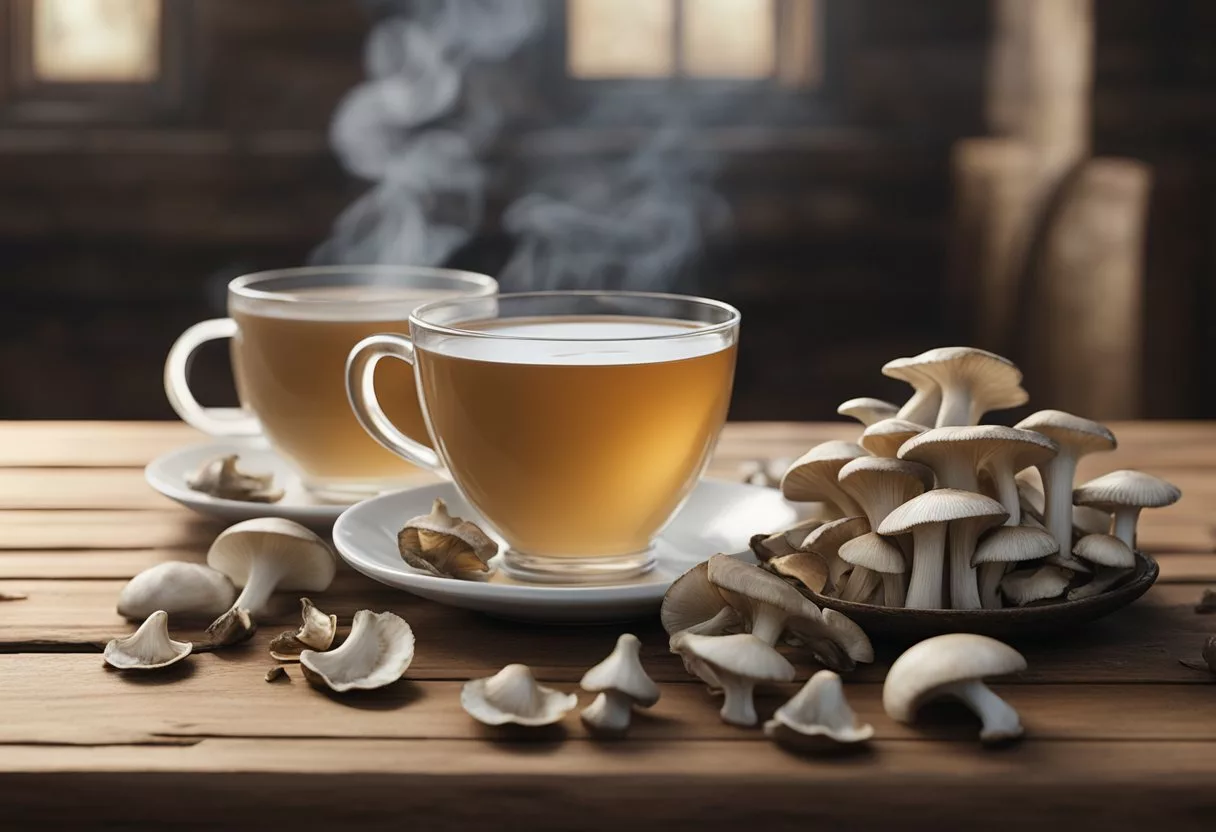
Making oyster mushroom tea is simple. You can use whole mushrooms, mushroom powder, or a tincture.
These choices provide flexibility for those who prefer different preparation methods. Additionally, oyster mushrooms contain vital nutrients like iron, phosphorus, zinc, vitamin D, and selenium, making the tea a nutritious addition to your diet.
For those concerned about sustainability, oyster mushrooms are a great choice. They thrive on organic waste, making them an environmentally friendly crop. Drinking oyster mushroom tea not only supports your health but also benefits the planet.
Key Takeaways
- Oyster mushroom tea offers multiple health benefits.
- The tea is easy to prepare with various forms of mushrooms.
- Cultivating oyster mushrooms is eco-friendly and sustainable.
Understanding Oyster Mushrooms

Oyster mushrooms, particularly Pleurotus ostreatus, are notable for their unique properties and health benefits. They are known for their rich nutritional profile and various species.
Taxonomy and Species
Oyster mushrooms belong to the genus Pleurotus. They include notable species like Pleurotus pulmonarius, Pleurotus eryngii, and Pleurotus ostreatus. These fungi are often found growing on dead wood in forests.
The name “oyster” comes from their oyster-shaped cap. Each species varies slightly in color and flavor.
For instance, Pleurotus ostreatus typically has a pale color, while Pleurotus eryngii is thicker and meatier.
While common in natural settings, these mushrooms are also cultivated commercially. They are popular in various cuisines worldwide due to their versatility and taste.
Characteristics of Pleurotus Ostreatus
Pleurotus ostreatus, the most common oyster mushroom, has several distinguishing features. It has a broad, oyster-shaped cap, usually white to light gray. The gills beneath are white and dense, providing a creamy texture when cooked.
These mushrooms grow in clusters, thriving in damp, wooded areas. They play a crucial role in decomposing dead trees, breaking down tough plant materials.
Pleurotus ostreatus is also prized for its medicinal properties. Traditional Chinese Medicine uses these mushrooms to relax joints and muscles. They contain beta-glucans, which support immune function and may reduce blood sugar levels in people with diabetes.
Nutritional Profile
Oyster mushrooms are rich in vitamins, minerals, and other nutrients. They are low in calories but high in protein, making them a healthy addition to any diet.
They provide essential amino acids, which are the building blocks of proteins.
Here is a breakdown of their nutritional content per 100 grams:
- Calories: 33
- Protein: 3.3 grams
- Carbohydrates: 6 grams
- Fiber: 2.3 grams
- Fat: 0.4 grams
These mushrooms are also a good source of B vitamins, including niacin and riboflavin. They contain significant amounts of minerals like iron, zinc, and potassium. Additionally, their prebiotic fibers support gut health, benefiting the digestive system.
Health Benefits of Oyster Mushrooms

Oyster mushrooms are packed with nutrients and bioactive compounds. These mushrooms may enhance the immune system, support heart health, regulate blood sugar and cholesterol levels, exhibit antioxidant and anti-inflammatory effects, and even possess potential anticancer properties.
Boosting the Immune System
Oyster mushrooms contain beta-glucans, polysaccharides, and pleuran, which are known for their immune-boosting properties.
Beta-glucans can activate immune cells such as macrophages and natural killer cells. These immune cells help the body fight infections and reduce the risk of disease.
Additionally, oyster mushrooms are rich in vitamin D[1], which supports overall immune health. The mushrooms’ proteins and iron also aid in producing antibodies and white blood cells.
Supporting Heart Health
Oyster mushrooms contribute to heart health in several ways. They are low in calories and fats, which helps maintain a healthy weight and reduce the risk of heart disease.
The mushrooms contain potassium, magnesium, and fiber, which work together to regulate blood pressure.
High potassium levels can relax blood vessel walls, reducing tension and lowering blood pressure. Meanwhile, fiber helps manage cholesterol levels, reducing the risk of plaque buildup in the arteries.
Regulating Blood Sugar and Cholesterol
Oyster mushrooms help in regulating blood sugar levels and lowering cholesterol.
They contain beta-glucans that slow the absorption of sugars in the digestive system, maintaining stable blood sugar levels.
Additionally, the mushrooms have minimal fat content and can aid in reducing LDL cholesterol. Their fiber content also binds to cholesterol in the intestines, preventing its absorption into the bloodstream.
Antioxidant and Anti-inflammatory Effects
The antioxidants found in oyster mushrooms include ergothioneine, vitamin C, and various phenolic compounds. These antioxidants combat free radicals, preventing cellular damage.
Oyster mushrooms also have significant anti-inflammatory properties[2]. These properties can reduce inflammation in the body, which is linked to chronic conditions like arthritis.
Potential Anticancer Properties
Oyster mushrooms have shown potential anticancer properties due to their bioactive compounds, such as polysaccharides and pleuran.
These compounds can inhibit cancer cell growth and enhance the efficacy of conventional cancer treatments.
Research is ongoing, but initial findings suggest that eating oyster mushrooms might reduce the risk of certain types of cancers. These mushrooms also provide essential nutrients such as zinc, iron, and vitamin D, which support overall health and can contribute to cancer prevention.
Oyster Mushroom Tea Preparation
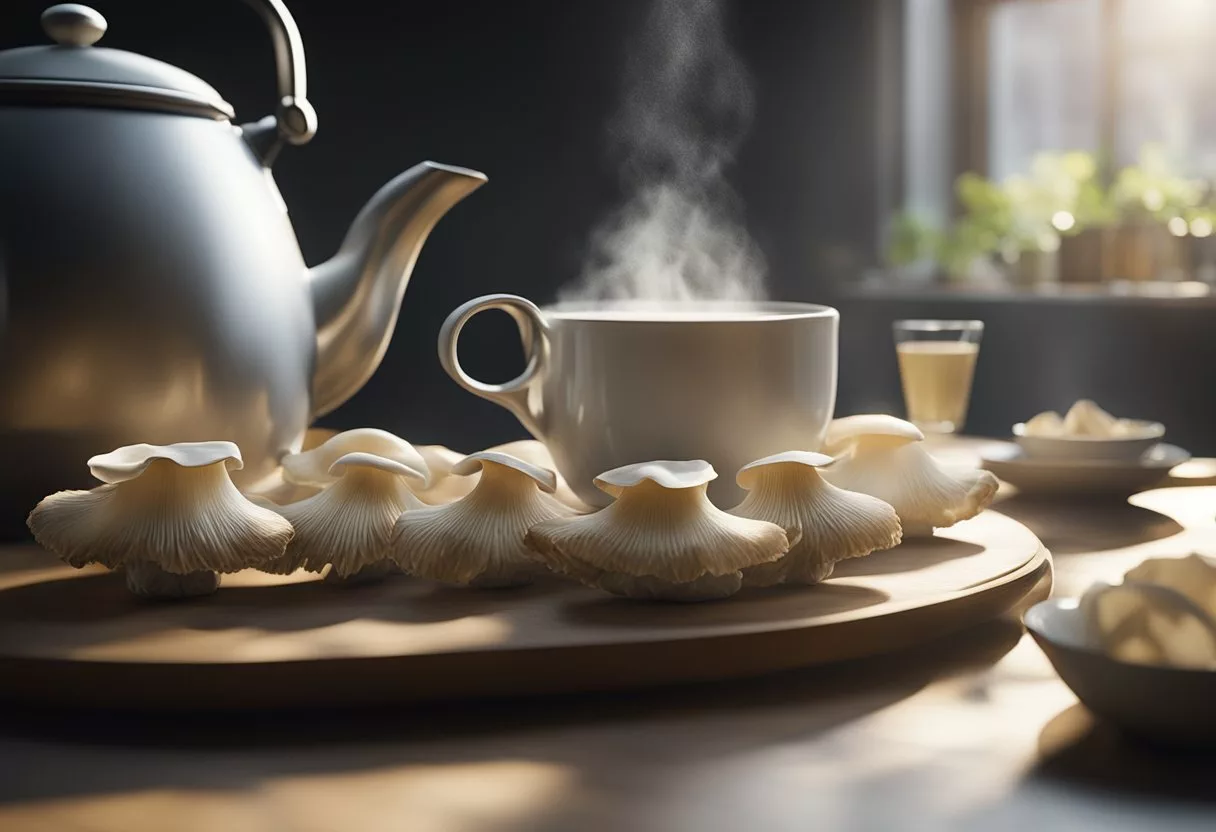
Oyster mushroom tea offers a nutritious and flavorful drink that can be easily prepared at home. Follow these steps to choose the right fungi, brew the tea, and serve it perfectly.
Choosing the Right Fungi
Choosing fresh, high-quality oyster mushrooms is essential. They should be firm and free from spots or discoloration.
Look for a mild aroma, which indicates freshness. Avoid mushrooms with a slimy texture or an overly strong smell. White or grey oyster mushrooms are typically used, but brown varieties can add a richer flavor.
Step-by-Step Brewing Guide
1. Preparation:
- Gather Ingredients: Fresh oyster mushrooms, water, tea bag, honey, and lemon (optional).
- Equipment: Saucepan, stovetop, strainer.
2. Processing the Mushrooms:
- Clean: Rinse mushrooms under cold water to remove dirt and debris.
- Chop: Cut into small pieces or grind into powder for a more intense flavor. Fine grinding can enhance medicinal benefits and taste.
3. Brewing:
- Boil Water: Bring one cup of water to a boil in a saucepan.
- Add Mushrooms: Place chopped mushrooms into the boiling water. Reduce heat and let it simmer for about 10-15 minutes.
- Strain: Remove mushrooms from the water using a strainer.
- Add Tea Bag: Place a tea bag into the hot mushroom-infused water. Let it steep for 5-10 minutes depending on desired strength.
4. Flavoring:
- Enhance Taste: Add honey and lemon to enhance flavor and aroma.
- Cool Down: Allow the tea to cool slightly before serving.
Serving Suggestions
Oyster mushroom tea can be enjoyed hot or cold. Serve it in cups with a wedge of lemon on the side. The tea pairs well with light snacks like crackers or fresh fruit.
For an added twist, incorporate the tea into soups and stews to enhance the nutritional value. It can also be used as a base for savory recipes, adding a rich, earthy flavor.
Cultivation and Harvest of Oyster Mushrooms
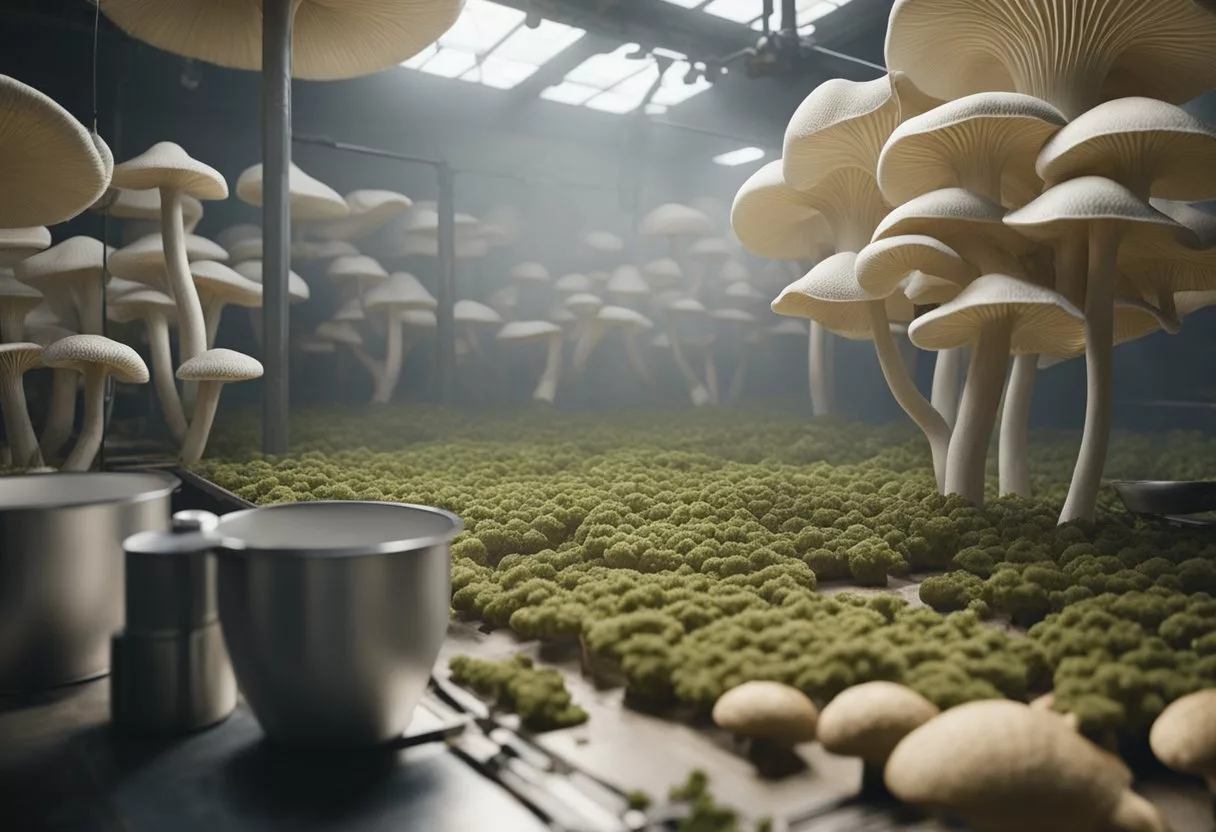
Oyster mushroom cultivation involves specific growing conditions and substrates to optimize yield and biological efficiency. The process covers everything from the selection of materials to the harvesting of mature fruiting bodies.
Growing Conditions and Substrates
Oyster mushrooms thrive in a controlled environment with high humidity and indirect light. The ideal temperature ranges from 20°C to 28°C.
Proper ventilation is also crucial to reduce the buildup of CO2, which can hinder growth.
Common substrates include straw, sawdust, and tea waste.
Studies suggest that tea waste combined with other materials like sawdust can provide a cost-effective and nutrient-rich base, significantly improving growth rates and yields. A substrate mix containing 40%-60% tea waste has shown to yield optimal results.
Harvesting the Fruiting Bodies
Fruiting bodies should be harvested when the caps are fully open but before they flatten out. This ensures the mushrooms are at their peak nutritional value.
The best method is to twist and pull the mushrooms gently to avoid damaging the mycelium.
After harvesting, it is crucial to handle the mushrooms with care to maintain their quality. They should be stored in a cool, dry place and consumed or processed quickly to preserve their freshness and nutritional benefits. Oyster mushrooms can be used in various dishes or as mushroom supplements.
Yield and Biological Efficiency
Yield and biological efficiency are key metrics in oyster mushroom cultivation. Biological efficiency refers to the weight of the harvested mushrooms relative to the dry weight of the substrate used.
An efficient setup can achieve high yields with minimal resource input.
Substrates with a high nutrient content, such as those containing tea waste, can improve biological efficiency. Research indicates that substrates with the right balance of nutrients can significantly boost not only the yield but also the quality of the mushrooms.
Using enriched substrates can lead to a higher growth rate and more productive harvests.
For more information, readers can consult studies like “Optimizing tea waste as a sustainable substrate for oyster mushroom” at Frontiers in Sustainable Food Systems[3] and “Tea waste: an effective and economic substrate for oyster mushroom” at PubMed[4].
Nutrition and Consumption
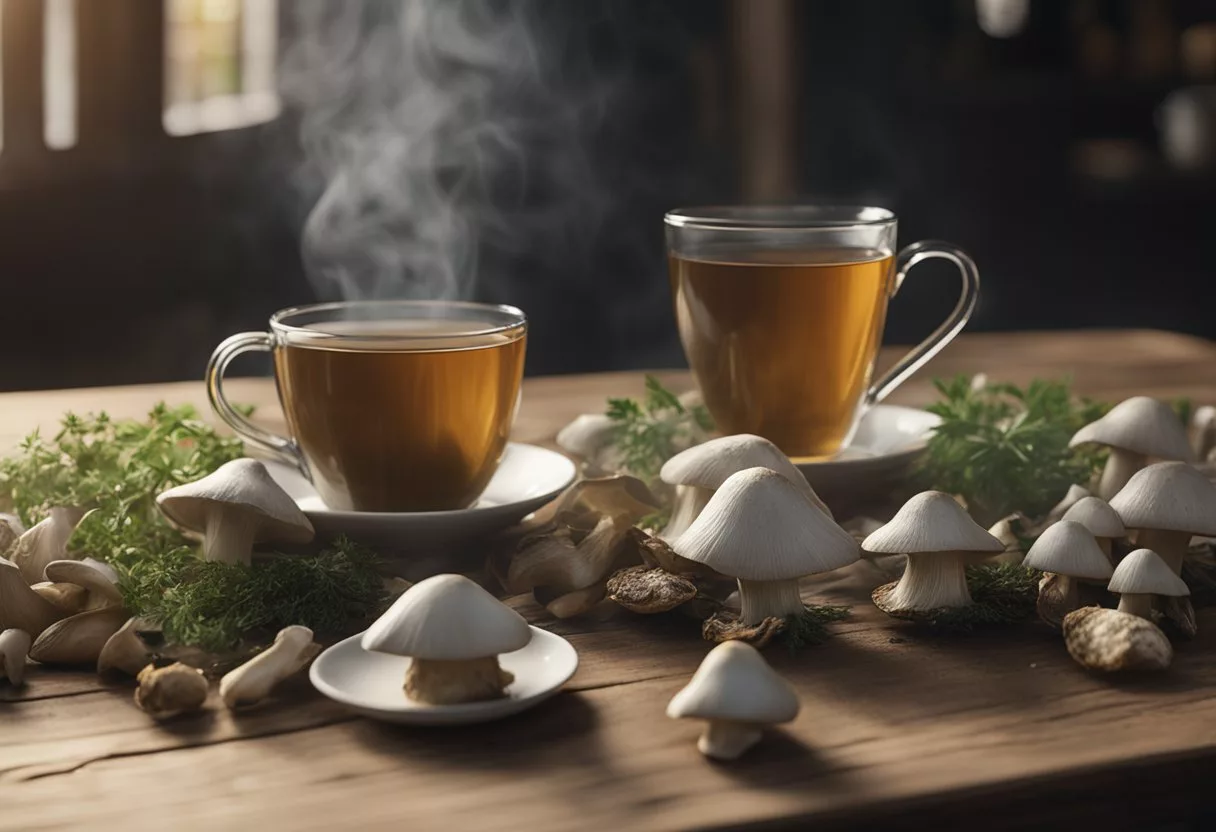
Oyster mushrooms are nutrient-dense, providing essential vitamins and minerals, and are low in calories. They are not only beneficial for health but also versatile in culinary preparations, from teas to soups and stir-fries.
Dietary Importance
Oyster mushrooms are packed with proteins, vitamins, and minerals. A 100-gram serving contains approximately 33 calories and 3 grams of protein.
They are rich in essential nutrients like iron, potassium, and magnesium, which support heart health and maintain blood pressure levels.
They also provide fiber, aiding in digestion and cholesterol management.
Another notable component is vitamin D, which helps in calcium absorption and bone health.
Oyster mushrooms also contain ergothioneine, an antioxidant with anti-inflammatory properties, and amino acids that are crucial for overall health.
Innovative Culinary Uses
Oyster mushrooms can be used in numerous recipes due to their mild flavor and firm texture. They work well in teas, which can boost the immune system and provide essential nutrients.
In stir-fries and soups, their texture enhances the dish, providing a chewy consistency.
Adding them to stews can enrich the flavor while adding vitamins and minerals. They can also be paired with other mushrooms like shiitake, maitake, and chaga for a varied nutrient profile and rich taste.
Supplemental Forms and Dosages
Oyster mushrooms are available in various supplemental forms, including capsules, powders, and extracts. These supplements provide a convenient way to get the benefits of oyster mushrooms without cooking.
Typical dosages range from 500 mg to 1500 mg per day, depending on the product and individual needs.
Mushroom supplements often include standardized levels of active compounds like vitamin D and ergothioneine.
They help in managing triglycerides and supporting the immune system.
Consulting a healthcare provider before starting any supplement is recommended to determine the appropriate dosage and ensure safety.
Safety and Considerations
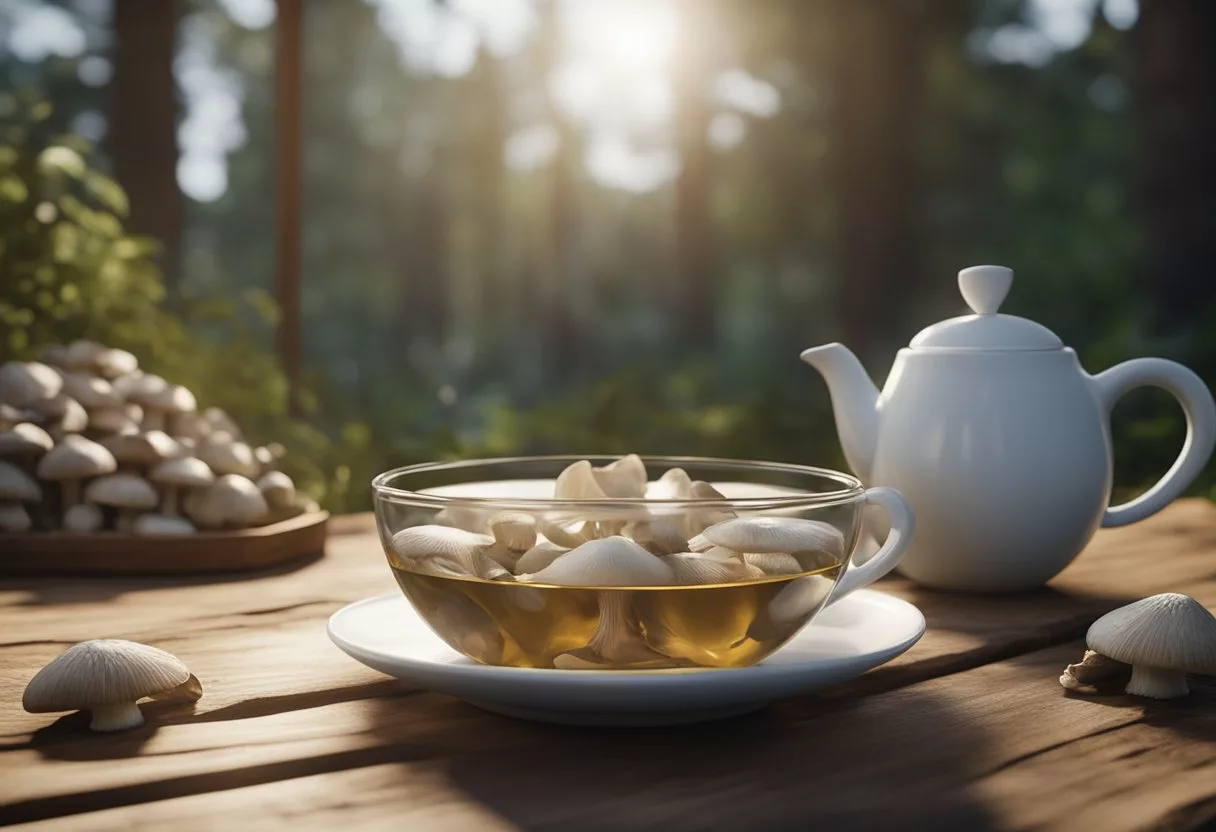
Safety and potential interactions are important when consuming oyster mushroom tea. Knowing about possible allergies and ensuring high-quality products are key steps for safe consumption.
Allergies and Interactions
Some people may have allergic reactions to oyster mushrooms. Symptoms can include itching, swelling, or difficulty breathing.
It is essential to consult with a healthcare professional if you suspect an allergy, especially since mushrooms are known to have bioactive compounds and immunomodulating properties.
Oyster mushrooms may also interact with certain medications. For example, their antioxidant ergothioneine could affect blood clotting, making it important to talk to a doctor if you are taking blood thinners.
Pregnant women should be cautious too, as the mushrooms contain folic acid and other nutrients that might interact with prenatal vitamins.
Key Considerations:
- Consult a doctor if you suspect allergies.
- Be aware of potential interactions with medications.
- Pregnant women should exercise caution.
Quality and Standards
Ensuring the quality of oyster mushroom tea is vital. It is best to choose products that meet FDA or USDA standards to avoid contamination. Look for tea that is free from additives and preservatives.
High-quality oyster mushrooms used in tea should be fresh and properly handled. Contamination can occur if they are not cleaned and stored correctly.
Some products may even be labeled as mushroom supplements, which often meet stringent quality controls.
Key Tips:
- Choose FDA or USDA-approved products.
- Avoid teas with additives and preservatives.
- Ensure fresh and properly stored mushrooms for safety.
Environmental Impact and Sustainability

Oyster mushroom cultivation using tea waste as a substrate offers many environmental benefits. This practice contributes to the circular economy, aids in composting and waste reduction, and promotes biodiversity.
Role in Circular Economy
Oyster mushroom cultivation supports the circular economy by turning waste products into useful resources. Using tea waste as a substrate reduces the need for traditional farming materials like cottonseed hulls, replacing them with a readily available alternative.
This not only lowers the cost for growers but also lessens the environmental footprint of mushroom farming.
Furthermore, utilizing tea waste decreases landfill usage, giving a new purpose to what would otherwise be discarded.
The resulting oyster mushrooms are rich in micronutrients, providing a nutritious food source and highlighting the full spectrum of benefits from sustainable practices.
Composting and Waste Reduction
Tea waste can play a significant role in composting and waste reduction. When used as a mushroom substrate, it helps decompose organic materials efficiently.
This process not only produces oyster mushrooms but also generates nutrient-rich compost.
This compost can then be applied to fields, gardens, and green spaces to enhance soil quality. The practice avoids methane emissions from decomposing organic waste in landfills, directly addressing environmental impact concerns.
Thus, turning tea waste into mushroom substrate and then compost ensures a complete cycle of use and reuse, aligning with sustainable waste management practices.
Promoting Biodiversity
Growing oyster mushrooms on tea waste promotes biodiversity in several ways. The decomposition of tea waste by oyster mushrooms introduces beneficial fungi and microorganisms into the soil.
These organisms improve soil health and support diverse plant life.
Additionally, the practice encourages the use of various mushroom strains, fostering genetic diversity within the species.
Different strains of oyster mushrooms have different growth rates and disease resistances, making the overall population more resilient.
By integrating different strains and organic waste, this method enhances the ecological balance in agricultural environments.
Frequently Asked Questions
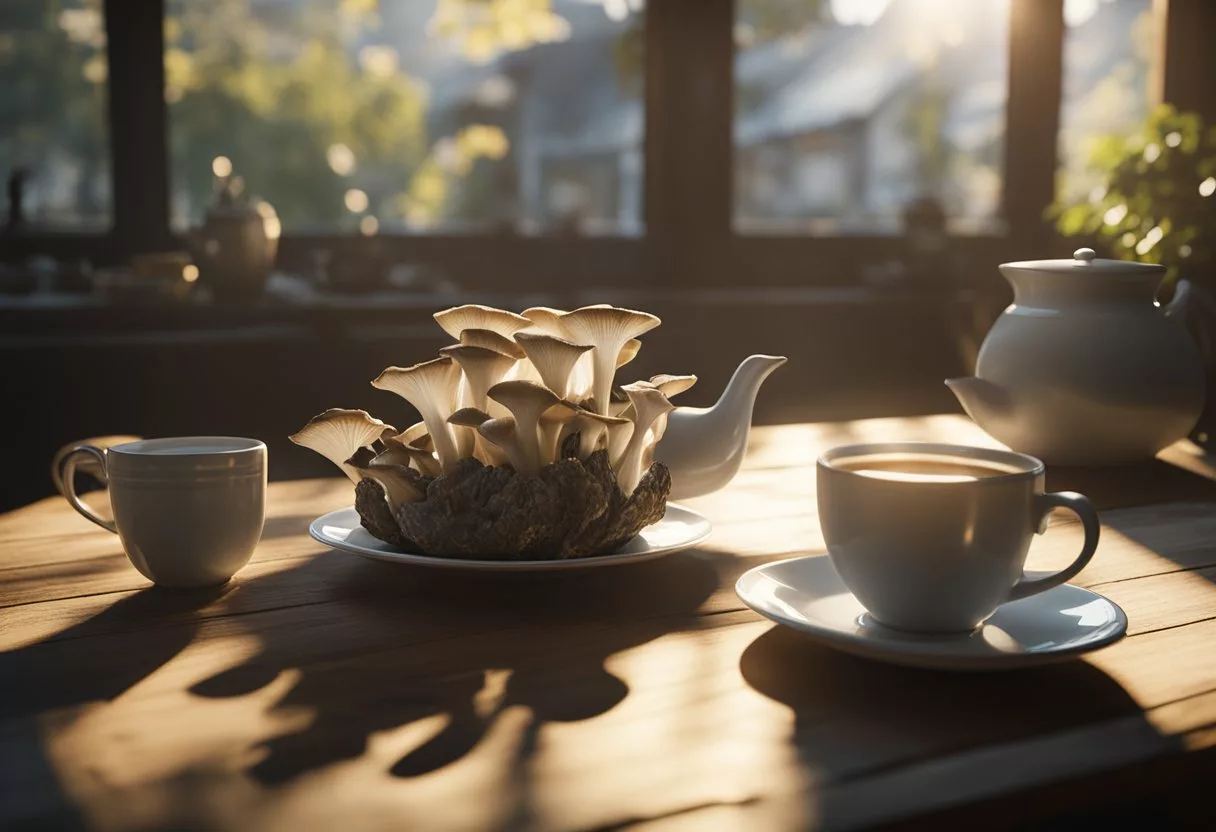
Oyster mushroom tea offers numerous health benefits, including potential support for detoxification and liver function. This section addresses common inquiries about its health effects, recipe, and other properties.
What are the health benefits of drinking oyster mushroom tea?
Oyster mushroom tea is rich in vitamins, minerals, and antioxidants. These nutrients can help enhance your immune system, improve heart health, and lower blood sugar levels.
Oyster mushrooms also have anti-inflammatory properties that may reduce the risk of chronic diseases.
Can you provide a recipe for making oyster mushroom tea?
To make oyster mushroom tea, you need dried oyster mushrooms. Boil water and add the dried mushrooms. Let them steep for 10-15 minutes. Strain the mixture and enjoy.
Optionally, add honey or lemon to enhance the flavor. For detailed instructions, visit this step-by-step guide[5].
Are there any known side effects associated with consuming oyster mushroom tea?
Oyster mushrooms are generally safe to consume. Some people may experience mild digestive issues such as bloating or discomfort.
If you have mushroom allergies, you should avoid oyster mushrooms. Always consult a healthcare provider before adding new foods or supplements to your diet.
How does oyster mushroom tea support detoxification processes?
Oyster mushrooms contain powerful antioxidants like ergothioneine and glutathione. These antioxidants help neutralize free radicals and support the body’s natural detox processes.
Drinking oyster mushroom tea regularly can aid in cleansing the liver and other organs.
In what ways are oyster mushrooms beneficial for skin health?
Oyster mushrooms are packed with vitamins, especially vitamin D and B-complex vitamins. These nutrients support healthy skin by improving elasticity and hydration.
Antioxidants in the mushrooms help protect skin cells from damage caused by UV exposure and pollution.
What effects do oyster mushrooms have on liver function?
Oyster mushrooms may positively impact liver health due to their antioxidant properties. Compounds in the mushrooms help protect liver cells from oxidative stress. They also improve the liver’s ability to detoxify the body.
References
- 7 Impressive Benefits of Oyster Mushrooms. https://www.healthline.com/nutrition/oyster-mushroom-benefits Accessed October 29, 2025
- 404. https://www.medicinenet.com/24_impressive_benefits_of_oyster-mushrooms/article.htm Accessed October 29, 2025
- Frontiers. https://www.frontiersin.org/journals/sustainable-food-systems/articles/10.3389/fsufs.2023.1308053/full Accessed October 29, 2025
- Tea waste: an effective and economic substrate for oyster mushroom cultivation. https://pubmed.ncbi.nlm.nih.gov/25690537/ Accessed October 29, 2025
- Redirecting.... https://www.yourdreamcoffeeandtea.com/how-to-make-mushroom-tea/ Accessed October 29, 2025
